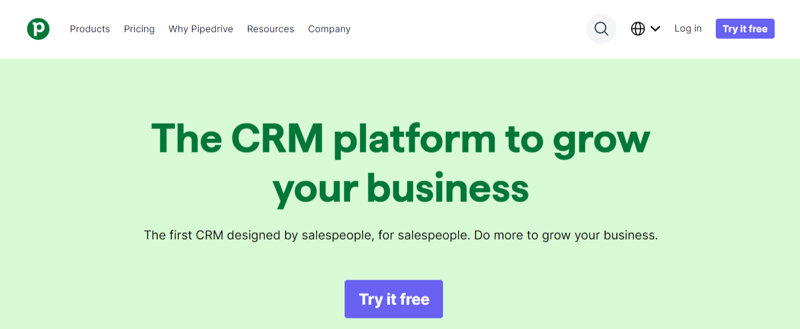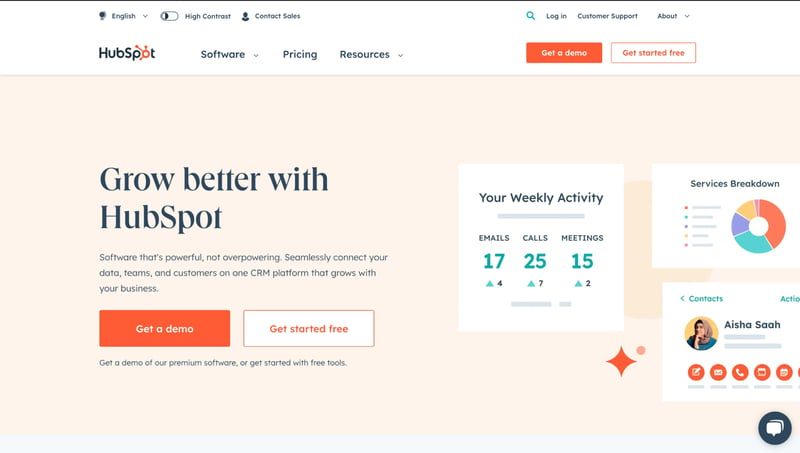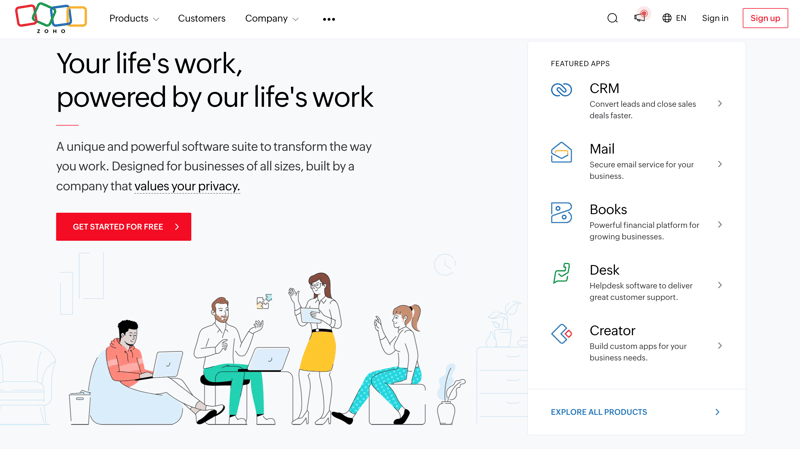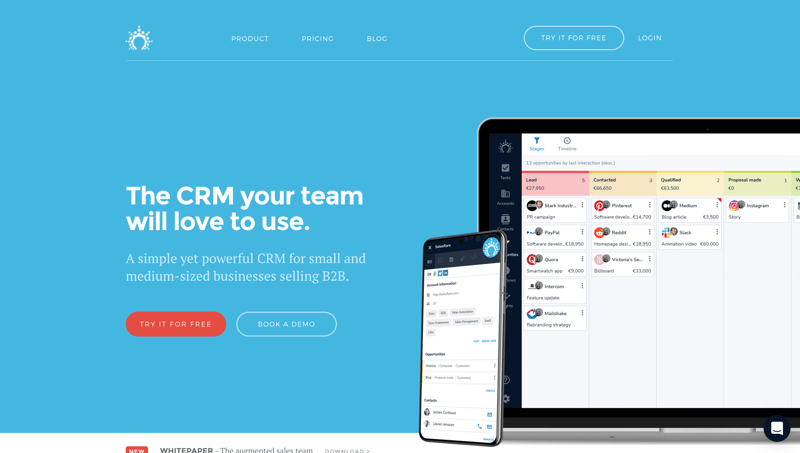
A Straightforward Guide to CRM Lead Management
 Updated on
Updated on
 By Bradley Kovacs
By Bradley Kovacs
Bradley Kovacs
Bradley has been passionate about technology since childhood, starting with Microsoft Flight Simulator at age six. In college, he automated his data e...
learn more
Bradley Kovacs
Bradley has been passionate about technology since childhood, starting with Microsoft Flight Simulator at age six. In college, he automated his data e...
Table of Contents
Table of Contents
CRM lead management is where chaos turns into order, and your sales and marketing efforts become a symphony of success.
Imagine a world where every lead is a potential gold mine, and you possess the alchemical powers to transform them into loyal customers. A lead management CRM is your secret potion, helping you focus on:
- The right leads
- Pinpoint the most lucrative channels
- Qualify incoming prospects
But how do these systems work? Think of it as a digital wizard, categorizing leads, scoring them like a judge at a talent show, nurturing them like a green-thumbed gardener, and creating lead segments with the precision of a master chef.
This article explores why CRM lead management is essential, how it works, considerations before choosing one, and our top software recommendations that get the job done right!
Why Is Having a CRM Lead Management System Important?

Customer Relationship Management(CRM) lead management system has become indispensable, especially in our client-centric world.In this section, we explore the multifaceted reasons why having a CRM lead management system is crucial for businesses of all sizes.
From focusing on the right leads to enhancing the productivity of your sales and marketing teams, we'll disentangle all the layers.
Helps You Focus on the Right Leads
By identifying sales-qualified leads, companies can efficiently distinguish between prospects with high conversion potential and those less likely to contribute to the bottom line.
This discernment allows for a targeted approach, wherein valuable time and resources are invested in nurturing the leads that hold the most significant promise. By cultivating relationships with these qualified leads, businesses position themselves to convert high-value prospects into loyal, long-term customers.
Consider the following facets illuminating the significance of lead management:
- Strategic Focus: CRM Lead management enables businesses to concentrate strategically on leads with the highest potential for conversion.
- Efficient Differentiation: A systematic approach facilitates the seamless identification and differentiation of qualified sales leads from those that may not align with the business objectives.
- Resource Optimization: By investing time and resources in nurturing qualified leads, firms optimize their efforts for maximum impact and value.
- Enhanced Conversion Rates: Focusing on the right leads increases the probability of converting these leads into devoted and loyal customers.
Adopting CRM lead management, your organization can precisely navigate the complexities of lead qualification and engagement, ensuring a transformative impact on sales endeavors.
Highlights Which Channels are the Most Lucrative for Generating Leads
The channel optimization process begins with data-driven CRM lead management system insights. This technology allows enterprises to evaluate the performance of each channel by quantifying key metrics such as conversion rates, customer engagement, and return on investment (ROI).
These insights reveal the efficacy of different channels, offering a clear roadmap for data-driven decision-making.
Social media platforms, email marketing, content marketing, and traditional advertising channels represent just a fraction of the diverse landscape through which businesses connect with potential leads. A CRM lead management system allows organizations to identify the most lucrative channels and understand their target audience's specific preferences and behaviors within each channel.
Moreover, a CRM lead management system facilitates the reallocation of resources based on performance metrics, ensuring that marketing budgets are optimized for maximum impact. This dynamic approach enables businesses to adapt swiftly to shifting market trends, emerging technologies, and evolving consumer behaviors, fostering agility in an ever-evolving vertical.
Gives You the Ability to Easily Qualify Incoming Leads
The ability to qualify incoming leads effectively is a pivotal element that can make or break a company's success. Lead qualification involves discerning the readiness and potential of a prospect to make a purchase, and a robust CRM lead management system is a powerful tool to streamline and enhance this critical aspect of the customer journey.
Here are a few reasons CRM lead management software is a must:
- Automated Lead Scoring: A key CRM lead management system feature is its capability to implement automated lead-scoring mechanisms. Lead scoring involves assigning numerical values to leads based on predefined criteria such as engagement level, demographics, and behavior.
- Customizable Qualification Criteria: Not all leads are created equal, and businesses often have unique criteria for a highly qualified lead. A CRM lead management system provides the flexibility to customize qualification criteria according to the specific needs and objectives of the business.
- Real-time Lead Insights: In a fast-paced business environment, timely information is critical. A CRM lead management system provides real-time insights into lead activities and interactions. This enables businesses to stay agile and responsive, adjusting their approach based on the latest data.
- Improved Sales and Marketing Alignment: The qualification process bridges marketing and sales teams. A CRM lead management system fosters improved alignment between these two crucial departments by ensuring that the criteria used for lead qualification are mutually agreed upon.
As the first step in the customer acquisition journey, effective lead qualification sets the foundation for building lasting relationships and driving sustained business growth.
Boosts the Productivity of Your Sales and Marketing Teams
A well-implemented CRM lead management system catalyzes heightened productivity among sales and marketing teams. The system frees up valuable time and resources by automating routine tasks and providing a centralized platform for communication and collaboration.
This newfound efficiency allows your team to focus on strategic activities, such as cultivating relationships with high-potential leads and refining marketing strategies for optimal impact.
Integrating a CRM lead management system enables improved communication and collaboration between sales and marketing teams. Real-time access to critical lead information ensures that both departments operate from the same playbook, eliminating redundancies and streamlining workflows.
This enhanced alignment accelerates decision-making and nurtures a culture of collaboration, where insights from both teams contribute synergistically to converting leads into loyal customers.
Furthermore, the analytical capabilities of a CRM lead management system empower teams with actionable insights. By leveraging interaction data, sales and marketing teams can:
- Continuously refine their strategies
- Identify areas for improvement
- Capitalize on emerging opportunities
This iterative approach not only enhances the overall productivity of your teams but also positions your organization for sustained success.
How a Lead Management CRM Works

Now, let's look into the mechanisms that drive the functionality of a lead management CRM system.
From categorizing and scoring leads to the art of lead nurturing, creating segments based on various parameters, and leveraging analytics for actionable insights, this section showcases the heterogeneous strategies and processes that constitute an effective lead management CRM.
Categorize Leads
Categorizing leads is the foundational step in a lead management CRM, involving systematically organizing potential prospects based on various criteria. By classifying leads into distinct categories, businesses gain a strategic advantage in tailoring their engagement strategies to align with the unique characteristics of each group.
Automation is critical in lead categorization, streamlining the process while reducing manual effort. The efficiency gained through automation accelerates the lead management process and minimizes the risk of human error.
A robust lead management CRM adapts dynamically to your evolving business needs, allowing you to refine and expand your categorization strategies as market dynamics and customer behaviors evolve. This adaptability ensures your company remains agile and responsive no matter the circumstance.
Score Leads
Lead scoring is a mechanism employed by lead management CRMs to quantify the potential of leads based on predefined criteria. Assigning numerical values to these criteria, businesses can prioritize leads, focusing their efforts on those with the highest likelihood of conversion.
One size does not fit all when it comes to lead scoring. Effective lead management CRMs (Like Ringy) allow businesses to customize scoring models to align with their goals and objectives. This customization enables organizations to assign weights to different criteria based on their unique significance, ensuring that the scoring mechanism reflects the nuances of the business's target audience and sales objectives.
Behavioral data is a valuable source for understanding lead intent and potential. Incorporating these insights, businesses elevate the accuracy of their lead-scoring models, ensuring a more refined and predictive approach to prioritizing leads.
Nurture Leads
Lead nurturing, a systematic process guiding leads through the sales pipeline, is crucial for lasting customer relationships. With Ringy's DRIP campaigns, you can implement personalized nurturing at scale, tailoring communication to lead preferences and behaviors.
Personalization is fundamental to successful lead nurturing.
To facilitate personalized nurturing, consider integrating these three things:
- Customer data
- Behavioral insights
- Dynamic content delivery
Automation tools within our CRM allow companies to tailor communication at scale, fostering engagement based on individual lead data.
Businesses using Ringy can adapt to evolving needs and behaviors by leveraging dynamic sequences, ensuring a personalized, practical lead nurturing approach.
Create Lead Segments
Lead segmentation involves categorizing leads into specific groups based on shared characteristics such as:
- Industry
- Location
- Demographics
- Behavior
Businesses can tailor their messaging and campaigns to resonate with distinct audience groups' unique needs and preferences by creating segments within a lead management CRM.
The criteria used for lead segmentation evolve in tandem with business objectives and market dynamics. Leveraging demographic data, behavioral insights, and engagement history, organizations can define criteria that align with their current marketing and sales priorities.
The segmentation of leads goes beyond organizational convenience; it is a strategic tool for enhancing personalization and campaign optimization. The result is improved engagement and increased conversion rates as messages align more closely with each audience group's specific needs and interests.
Analytics Provide Actionable Data
The wealth of data generated by a lead management CRM is a valuable asset for strategic decision-making. From lead performance metrics to campaign effectiveness, analytics provide a comprehensive view of the entire lead management process.
Real-time reporting is a cornerstone of agile decision-making. It allows your business to monitor lead performance metrics, track campaign effectiveness, and evaluate the overall health of its sales funnel. The immediacy of these insights empowers teams to make data-driven decisions swiftly.
Continuous improvement is a hallmark of successful lead management strategies, enabling businesses to experiment with different approaches and refine their strategy based on measurable outcomes.
The iterative nature of A/B testing ensures that organizations stay nimble, adapting their lead management tactics to align with market dynamics and customer expectations.
What You Should Consider Before Choosing a Lead Management CRM

As businesses strive to steer an ever-changing marketplace, the role of a robust CRM in streamlining lead processes, optimizing engagement strategies, and fostering lasting customer relationships must not be ignored.
However, with a myriad of options available, the task of choosing the most suitable lead management CRM requires careful consideration and strategic evaluation.
This table shows businesses the crucial factors they should weigh before making this climactic decision.
|
Feature Considerations |
Description |
|
Ease of Use |
A user-friendly interface and intuitive design are crucial for maximizing adoption and ensuring your sales and marketing teams can utilize the system efficiently. |
|
Price vs Feature Offered |
Choose a solution offering the features and functionality you need at a competitive price. Consider scalability as your business grows. |
|
Ability to Connect with Lead Vendors and Upload Lead Lists |
Seamless integration with lead generation services and uploading lead lists easily is essential for streamlining your lead capture and management process. |
|
Sales Pipeline Visualization |
A clear visual representation of your sales pipeline allows you to track lead progress, identify bottlenecks, and forecast revenue more effectively. |
|
Visual Lead Dashboards |
Real-time dashboards provide valuable insights into key lead metrics, enabling you to monitor performance and measure the success of your lead management efforts. |
|
Marketing Capabilities |
Consider a CRM solution offering automation features like email marketing, landing page creation, and campaign tracking to maximize your lead generation and conversion efforts. |
By carefully evaluating these feature considerations, you can make an informed decision that aligns seamlessly with your company's unique objectives and positions it for success.
5 Lead Management CRM Recommendations

The market is teeming with various options, each claiming to offer the best solution for managing leads effectively. Here, we'll check out five prominent lead management CRMs.
This review aims to guide you in making informed decisions that align with your specific needs and objectives by providing an in-depth analysis of each platform's features, strengths, and considerations.
Ringy
.png?width=800&height=361&name=Ringy%20(1).png)
Ringy is a comprehensive customer relationship and lead management sales software designed to empower businesses with tools for lead generation and marketing automation. Our platform goes beyond conventional CRM functionalities by providing a user-friendly dashboard that offers insights into crucial metrics, allowing you to streamline your operations efficiently.
Let's look at some of Ringy's key features.
|
Feature |
Description |
|
Calling |
Ensures high-quality calls, handling technical functions to reach leads effectively, allowing users to concentrate on meaningful conversations. Using smart local IDs prevents you from being an unknown caller, building trust with legitimate and localized numbers. |
|
Drip Campaigns |
Enables continuous contact with leads through automated campaigns. Users can select leads, set message intervals, message types (email or SMS), and content, ensuring ongoing engagement. Campaign templates facilitate quick setup and execution. |
|
SMS Management |
Facilitates viewing, sending, and organizing SMS directly from the dashboard or via a mobile app. Users can create templates, personalize messages, upload images, and schedule automated messages for optimal timing. |
|
Automation |
Employs AI technology to automate repetitive tasks, adapting messages based on prospect details. This feature ensures consistency across communication channels, allowing users to focus on essential tasks like calls, coaching, and strategic planning. |
|
API Integration |
Enables seamless integration with third-party apps such as Google Calendar, Zapier, and Facebook. Users can forward ongoing calls, receive voicemails, and generate operational reports for enhanced efficiency. |
Our holistic approach to combining calling, SMS, drip campaigns, and automation, positions Ringy as a robust solution for businesses aiming to boost their lead management and marketing efforts.
Give our two-week free trial a go to see just how effective our software is.
Pipedrive

Pipedrive offers a swift and hassle-free onboarding experience, providing organizations with a straightforward, affordable solution to achieve their objectives.
Whether streamlining follow-up automation, robust lead tracking, or enhancing business development and customer retention, Pipedrive's intuitive user interface ensures a rapid yet effective execution of tasks.
Pipedrive organizes and streamlines sales pipelines, making it an ideal choice for small businesses with compact sales teams. Its affordability and simplicity cater to companies seeking an efficient solution for automating the sales process.
However, an organization requiring a CRM beyond the sales team or those looking for a free solution might find Pipedrive less suitable.
As with any tool, understanding and aligning your business needs with Pipedrive's strengths will be crucial in determining if it fits your organization's CRM requirements correctly.
Hubspot

This dynamic cloud-based CRM platform is a complete solution catering to real estate, retail, construction, sales, marketing, accounting, and insurance industries.
Whether the focus is on B2C or B2B interactions, HubSpot provides a versatile framework for businesses to effectively nurture, monitor, and track prospects while meticulously analyzing key business metrics.
One of HubSpot's standout features is its user-friendly visual interface, offering a real-time panoramic view of the entire sales funnel. It significantly streamlines tracking customer interactions, allowing businesses to stay on top of engagements and seamlessly manage their sales pipelines. The intuitive design of the interface ensures that even those new to CRM systems can navigate effortlessly, making it an ideal choice for those having their first experience with customer relationship management.
For those keen on exploring the potential of HubSpot, the free plan serves as an entry point that is both generous and enduring. Opting for HubSpot CRM's free plan provides access to a suite of essential tools and extends this privilege to unlimited users.
This means businesses can seamlessly integrate contact management, customer service, marketing, and sales tools into their operations without incurring costs, ensuring sustained utility and flexibility in the long run.
Zoho

Zoho CRM serves as a versatile entry-level platform for small businesses undergoing growth. Its free plan, popular among new companies, facilitates basic lead tracking and contact management.
Users can opt for paid plans to unlock advanced features like marketing task automation and comprehensive customer data tracking, with seamless integrations for various third-party apps.
The platform boasts a user-friendly interface, particularly suitable for CRM beginners. The mobile app enhances accessibility, featuring a unique route planning functionality for efficient on-the-go meeting scheduling.
Zoho CRM's AI tool, Zia, is exclusive to higher-tier plans, offering predictive analysis and voice-to-text capabilities. The free tier accommodates up to three users and provides essential features, while paid plans offer progressively advanced functionalities. The top-tier plans include AI-powered features, advanced process management, and automated segmentation.
Zoho CRM is more budget-friendly than HubSpot, making it suitable for smaller businesses. Its scalable structure accommodates evolving business needs, providing essential features and the flexibility to unlock advanced capabilities.
Salesflare

Salesflare is an effective CRM and lead management solution tailored for small sales teams, distinguished by its adaptable pricing. Its inclusion in the list of premier lead management software is attributed to its robust CRM automation capabilities, significantly enhancing sales team workflows.
The platform excels in automation, allowing swift data collection, efficient logging of phone calls and meetings, and seamless execution of personalized email campaigns.
Notably, its email-finding tool proves invaluable in discovering the email addresses of leads previously encountered but not secured through direct contact.
Salesflare streamlines the sign-up process with a quick and user-friendly experience facilitated by seamless email integration.
CRM Lead Management - Final Thoughts
Effective CRM lead management is a cornerstone for businesses seeking sustainable growth and streamlined operations. The diverse array of CRM systems caters to various business needs, from small startups to large enterprises.
Features like automation, lead scoring and omnichannel communications enhance productivity and contribute to a more cohesive customer relationship strategy.
Understanding the unique requirements of your business is crucial in selecting the right CRM solution.
Amidst these options, Ringy is the optimal solution for managing a multitude of leads. Its intuitive interface, robust automation capabilities, and affordable pricing make it an ideal choice for businesses of all sizes.
As you enhance your lead management processes, consider Ringy, the robust, user-friendly solution to upgrade your CRM experience. Request a demo and experience efficient lead management like never before.

Skyrocket your sales with the CRM that does it all.
Calling? Check. SMS? Check. Automation and AI? Check. Effortlessly keep in touch with your customers and boost your revenue without limits.

Take your sales to new heights with Ringy.
Sales in a slump? Ringy gives you the tools and flexibility you need to capture leads, engage with them, and turn them into customers.
Subscribe to Our Blog
Enter your email to get the latest updates sent straight to your inbox!
Categories
Related Articles




































































































